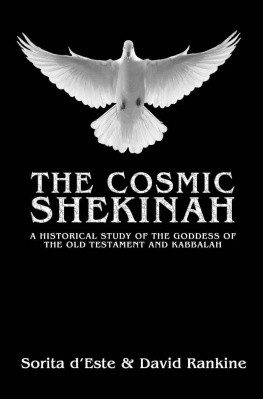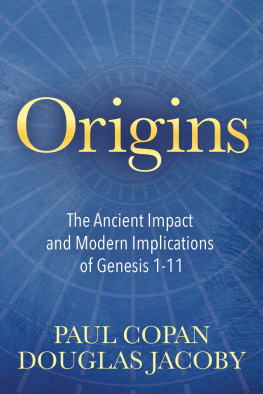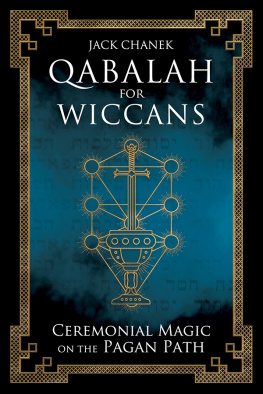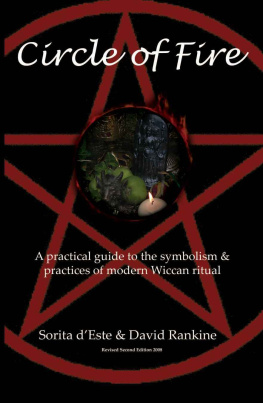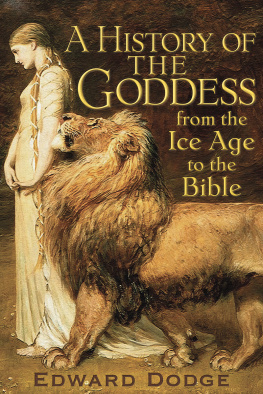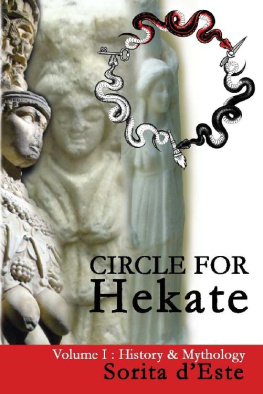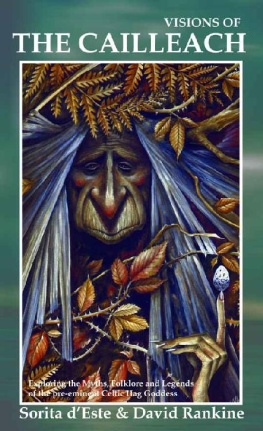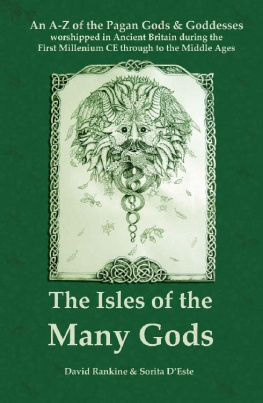THE COSMIC SHEKINAH
A historical study of the Goddess of the Old Testament and Kabbalah
By Sorita dEste & David Rankine
The first human never finished comprehending wisdom,
nor will the last succeed in fathoming her.
~ Jesus Sirach 24:28, Ben Sira , C2nd BCE.
ABOUT THE AUTHORS
Sorita dEste and David Rankine have both been exploring the history of religion, magic and mysticism for as long as they can remember. They have been working together since late 2000, producing hundreds of articles for journals, magazines and part-works; facilitating workshops and lecturing on the Kabbalah, Mysticism and Magic at national and international events. Between them they have authored more than 30 published books to date, many of which are on the subject of renaissance and medieval magic, religion, mythology and folklore.
If you enjoy The Cosmic Shekinah , you may also enjoy the following titles by the same authors, which include:
Hekate Liminal Rites A historic study of the spells, rituals and magical rites of the ancient goddess of crossroads.
Practical Qabalah Magick The Tree of Life explored in practice.
Visions of the Cailleach The history and folklore of the primeordial winter hag.
The Isles of the Many Gods An A-Z of the Gods & Goddesses of Ancient Britain through to the Middle Ages.

www.avaloniabooks.co.uk
Published by Avalonia
BM Avalonia, London, WC1N 3XX, England, UK
www.avaloniabooks.co.uk
The Cosmic Shekinah
Sorita and David Rankine, 2010
All rights reserved.
First Published by Avalonia 2011
Print Edition - ISBN 978-1-905297-51-1
Kindle Edition ISBN 978-1-905297-59-7
Typeset and design by Satori
Cover Art White Dove iStockPhoto
British Library Cataloguing in Publication Data. A catalogue record for this book is available from the British Library.
This book is sold subject to the condition that no part of it may be reproduced or utilized in any form or by any means, electronic or mechanical, including photocopying, microfilm, recording, or by any information storage and retrieval system, or used in another book, without written permission from the authors.
ACKNOWLEDGEMENTS
We would like to thank the following people for their assistance with this book:
Jerome Rothenberg for his kind permission to reproduce his translation of Isaac Lurias Hymn to Shekinah for the Feast of the Sabbath , first published in The Secret Garden , edited by David Meltzer, 1976.
Jerry Buterbaugh and Jon Buckley for sharing insights and information on the Manichean texts; Jonathan Carfax for sharing his resources on the Shekinah; Dr Nina Lazarus for sharing her historical research on Lilith; John Canard for sharing his views on the sacred World Tree;
Miguel Connor, Geoffrey Dennis, William G. Dever, Erik Hornung, Daniel Matt and Peter Schfer for their excellent and very useful research and writings.
Also: Eva Archer, Paul Harry Barron, Emily Carding, Michael Ellis, Elysia Gallo, Darcy Kuntz, Joseph C. Lisiewski, Stephen Skinner, Mark Townsend and Peter Tunder for their support, encouragement and enthusiasm for our work.
The students of our Qabalah Groups (Abergavenny & London), as well as the fraternity of the O.I.F. for their pertinent questions and perpetual thirst for knowledge which has encouraged us deeper into the mysteries over the years.
To Geraldine Beskin
Fount of Esoteric Wisdom
CONTENTS
Naming Wisdom
Manifestations
Behind the Veils
Shekinah Genesis
From Canaan
From Egypt
From Ancient Sumer
From the Semites
Mother of Aeons
The Christian & Islamic Goddess
Parallel Wisdom
The Tree of Life
Creation & the Created
Light of Creation
Mother of Angels
The Breath of Life
The Power of Prophecy
The Renaissance & Beyond
Wisdom
Bibliography
And the Holy Spirit rested upon him, teaching that the Shekinah only rests upon one who is joyful of heart."
Yalkut on Jonah 1.1
NAMING WISDOM
I learnt it all, hidden or manifest,
for I was taught by Wisdom,
by her whose skill made all things.
~ Wisdom of Solomon , C1st BCE, trans. Schfer.
The Shekinah is the primordial light of creation, the heavenly glory of divine wisdom and the inspiration for prophecy. She is also the world soul, manifest through the divine sparks of her light which comprise human souls and thus unites us all. With roots in the wisdom goddesses of the ancient world, the Shekinah is the manifestation of feminine divinity from the unnamed Wisdom Goddess of the Old Testament found in the Jewish mystical systems known as the Kabbalah and Merkavah mysticism.
The name Shekinah first appeared in material found in the Onkelos Targum , which dates from the first-second century CE. This text, by an unknown author, was misnamed during the medieval period after Onkelos the Proselyte (35-110 CE), who translated the Bible into Aramaic. In the Onkelos Targum the term Shekinah is used to illustrate a divine presence which is separate from Yahweh, as in the paraphrase of Exodus 25:8 ;
And they shall make before me a sanctuary and I shall cause my Shekinah to dwell among them.
The first glimpse of the power or function of the Shekinah is seen in the meaning of her name, which is derived from the Hebrew root Shakhan meaning to dwell . This meaning hints at her tangible presence as a visible manifestation of the light of wisdom in the books of the Old Testament , as the burning bush seen by Moses, in the Ark of the Covenant and in the Temple of Solomon. Her name was also Aramaized to Shekinta in some texts like the Targums, which are Aramaic translations of the Bible that often included commentaries.
The Shekinah is first hinted at as the unnamed Wisdom Goddess of the books of the Old Testament , as well as being named in apocryphal and pseudoepigraphical books from the latter part of this period, spanning a thousand years from the seventh or sixth century BCE through to the third or fourth century CE. Whilst it has been suggested that the Shekinah was simply a hypostasis of Gods glory, personifying his qualities, the traces found in these ancient writings make it clear that she was much more than this.
By exploring the myths and deities of the ancient Middle East, it becomes clear that the origins of the Shekinah may be found in several earlier goddesses associated with wisdom in civilizations such as those of Sumer, Egypt and Canaan. From the rich cultural cross-fertilization between these civilizations sprang the Shekinah.
The most prominent and wide-ranging descriptions of the Shekinah, her influence and roles may be found in the teachings of the Kabbalah, and Merkavah ( Chariot ) mysticism. Merkavah mysticism is a Jewish system of practices which formed the basis of the Kabbalah, and whose origins may be traced back to around the second century BCE. Merkavah mysticism encouraged the practitioner (called a Merkavah rider) to use amulets, prayers and repetitious chanting of divine names to enable their soul to ascend through the seven palaces or heavens to the presence of God, as described in the Biblical Book of Ezekiel .
The main Merkavah texts, called Hekhalot ( heavenly palace/hall ) texts were largely written in the period from the third-ninth century CE, and provide many of the richest and most useful descriptions of the Shekinah. These texts include Book of 3 Enoch or Sepher Hekhalot (C2nd-C6th CE), Hekhalot Rabbati (C3rd-C7th CE), Maaseh Merkavah (C3rd-C9th CE), Reuyot Yehezkiel (C4th CE) and Shiur Qoma (C7th-C12th CE)
Next page
